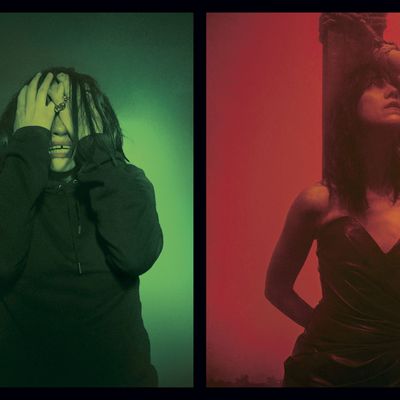
Four years ago at Cannes, Gaspar Noé shocked audiences at the Croisette with the graphic 3-D cum shots of Love. Last year, he surprised them with the dance-horror film Climax, the best thing he’d made in ages. This year, he put us in a mild state of sensory distress.
At 50 minutes long, Noé’s Lux Æterna — which premiered out of competition at a Saturday midnight screening — is neither a short nor a conventional feature. It was advertised ahead of time as “a vibrant essay on respect for beliefs, the actor’s craft, and the art of filmmaking,” which is certainly one way to put it. After an opening sequence assembled from an old German film about torture in the Middle Ages — the result, the narrator says, of medieval peasants having much closer ideas of demons and Hell than we do — we settle in for a long discussion between Béatrice Dalle and Charlotte Gainsbourg, who are playing themselves. Dalle has cast Gainsbourg in her directorial debut, a film about burning witches, but that’s secondary to the pair’s bull session about religion, so-called “entertainment films,” and the time a male co-star accidentally ejaculated on Gainsbourg’s leg (which may inspire a trip to Nymphomaniac’s IMDb page to check out the suspects). The whole thing takes place in split screen, and Noé periodically splices in title cards with quotes about filmmaking from directors like Rainer Werner Fassbinder, which have been translated into Latin.
Once Gainsbourg actually steps on Dalle’s set, though, all hell breaks loose. The production is a mess, partially because Dalle seems to be not a very good director, and partially because her male producer is plotting against her. (“Béatrice Dalle? More like Béatrice Fail,” someone says.) The set is a blur of chaotic conversations taking place in French and English simultaneously, everyone is freaking out about everyone else not doing their jobs correctly, and there are a ton of meta in-jokes that you will probably understand if you know more about the French film industry than me. It’s just a bad scene all around.
But what I suspect everybody will be talking about comes in the film’s last ten minutes. After an electrical mishap, Dalle’s set is bathed in flashing neon strobe lights and harsh, jarring sirens, and no one on set seems able to turn them off. The viewers of Lux Æterna are forced to sit through the ordeal alongside Dalle’s actors, and the whole thing climaxes as Gainsbourg loses herself in misery and finally enters the state of pure abject suffering that Dalle had been after. (The DP, who was in on the conspiracy against the director, finally gets his perfect shot.) For the audience, the terrible lights and noises last through the closing credits.
What’s going on? Throughout the project, Noé is focused on the process by which film transforms from a commercial product into a pure art form. As far as I can guess, he sees this kind of mild torture as the antidote for the mindless entertainment of popular cinema. Or in other words, only by fucking with his audience can he truly free them. The Cannes audience is famed for its prickliness, but they seemed to get through the ordeal without much grumbling. From my vantage point in the balcony, I only saw one walkout, though many in the audience resorted to covering their eyes or plugging their ears at times. (In the lobby afterward, at least one person had clearly been crying.) The famous boo-birds of the Palais were not out tonight: Once the credits stopped, the audience cheered — and not just because the house lights were finally on.


